
While the number of Georgians taking the COVID-19 vaccines increased from last week, Georgia officials preached patience Thursday as the vaccine supply remains well-shy of the demand.
Gov. Brian Kemp and Georgia Public Health Department Commissioner Dr. Kathleen Toomey urged Georgians to continue following safety precautions – including wearing a face mask – since it will be a while before the vaccine is more widely available to the public.
The state health department reported as of Thursday evening, more than 590,000 doses have been administered in Georgia, or more than 50% of the total shipped to the Peach State. By comparison, fewer than 94,000 vaccine doses had been delivered by Jan. 5. The first doses arrived in Georgia in mid-December.
Still, work remains to get health care workers and Georgians living in long-term care facilities vaccinated and then other segments of the population, Kemp said during a Thursday afternoon press conference at the state Capitol.
The state has been in contact with President Joe Biden’s administration about expanded distribution, Kemp said. Biden has pledged to provide 100 million vaccinations within his first 100 days in office.
Georgia now receives about 120,000 doses weekly, far short of what is needed to vaccinate a state with nearly 11 million residents
“We will still have far more demand than we have supply,” Kemp said. “We have now administered over a half a million vaccines, but the expanded 1a population accounts for over two million people.”
But there is also concern that people will refuse to take the shot even when it is made available to them, partly due to rampant misinformation surrounding the vaccine.
Toomey said Thursday that this is already a problem even within her agency: Only about 30% of the state’s public health workers across the state wanted the shot when it was offered to them.
“We had so little uptake among health care workers that it was, frankly, to be disappointing not only because they are at high risk to acquire COVID, but that they serve as role models in the community,” Toomey said Thursday during her department’s budget hearing.
She said the vaccination effort is battling hearsay that casts doubt on the value of getting a shot.
“And if your own doctor or your own nurse or your sister, your cousin who is a nurse’s aide or staff at a hospital say, ‘Well, I wouldn’t get that,’ I think that that sets a tone of distrust that makes it even harder for us to get the kind of support we want across all Georgia,” she added.
Toomey said this week that it might take “many, many, many months” to vaccinate the public. There are about 400 providers who have administered the vaccine in Georgia, but she said more than 1,600 have signed up to help get the shots into Georgians’ arms.
“But I am reluctant to send them vaccine until we know that we have reached a cadence of regular vaccine shipments, and that may not happen several weeks into the new federal administration,” she said.
The state health department reports more than 701,000 confirmed COVID-19 cases and 47,680 hospitalizations as of late Thursday. More than 11,000 Georgians have died from COVID-19, with Tuesday marking the deadliest day with 170 reported deaths. The previous record was 157 deaths on Jan. 15.
There have also been five reported cases in Georgia of the new COVID variant that doesn’t appear to be more deadly but is more contagious, Toomey said.
Kemp noted that hospitalizations have dropped to about 5,332 patients on Thursday, the lowest it’s been in a couple of weeks, and that the state’s positive test rate has gone from 19.5% to 16.7% since Jan. 5.
“Just a reminder though, these numbers are all higher than our summer surge,” Kemp said. “It is certainly welcomed news that the steady increases we saw over Thanksgiving, Christmas and New Years are now starting to decline.
“However, I want to be clear with Georgians watching this, our hospitals cannot handle another surge in COVID-19 patients on top of their current workload.”
Georgia Recorder Deputy Editor Jill Nolin contributed to this report.







